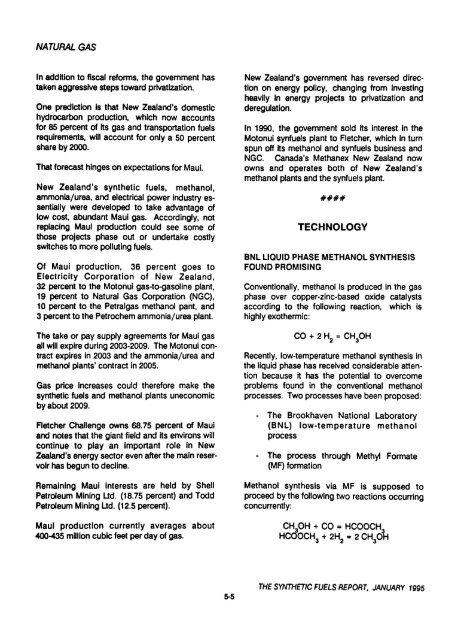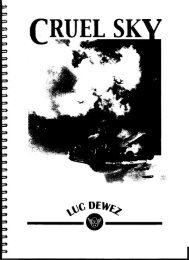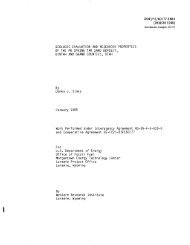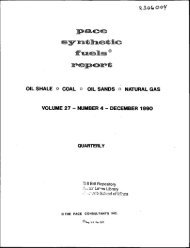Ikelic - Alliance Digital Repository
Ikelic - Alliance Digital Repository
Ikelic - Alliance Digital Repository
Create successful ePaper yourself
Turn your PDF publications into a flip-book with our unique Google optimized e-Paper software.
NATURAL GAS<br />
In addition to fiscal reforms, the government has<br />
taken aggressive steps toward privatization.<br />
One prediction is that New Zealand's domestic<br />
hydrocarbon production, which now accounts<br />
for 85 percent of its gas and transportation fuels<br />
requirements, will account for only a 50 percent<br />
share by 2000.<br />
That forecast hinges on expectations for Maui.<br />
New Zealand's synthetic fuels, methanol,<br />
ammonia/urea, and electrical power industry es<br />
sentially<br />
were developed to take advantage of<br />
low cost, abundant Maui gas. Accordingly, not<br />
Maui production could see some of<br />
replacing<br />
those projects phase out or undertake costly<br />
switches to more polluting fuels.<br />
Of Maui production, 36 percent goes to<br />
Electricity Corporation of New Zealand,<br />
32 percent to the Motonui gas-to-gasoline plant,<br />
19 percent to Natural Gas Corporation (NGC),<br />
10 percent to the Petralgas methanol pant, and<br />
3 percent to the Petrochem ammonia/urea plant.<br />
The take or pay supply agreements for Maui gas<br />
all will expire during 2003-2009. The Motonui con<br />
tract expires in 2003 and the ammonia/urea and<br />
methanol<br />
plants'<br />
contract in 2005.<br />
Gas price increases could therefore make the<br />
synthetic fuels and methanol plants uneconomic<br />
by about 2009.<br />
Retcher Challenge owns 68.75 percent of Maui<br />
and notes that the giant field and its environs will<br />
continue to play<br />
Zealand's energy<br />
voir has begun to decline.<br />
an important role in New<br />
sector even after the main reser<br />
Remaining Maui interests are held by Shell<br />
Petroleum Mining Ltd. (18.75 percent) and Todd<br />
Petroleum Mining Ltd. (12.5 percent).<br />
Maui production currently averages about<br />
400-435 million cubic feet per day of gas.<br />
5-5<br />
New Zealand's government has reversed direc<br />
tion on energy policy, changing from investing<br />
heavily in energy projects to privatization and<br />
deregulation.<br />
In 1990, the government sold its interest in the<br />
Motonui synfuels plant to Fletcher, which in turn<br />
spun off its methanol and synfuels business and<br />
NGC. Canada's Methanex New Zealand now<br />
owns and operates both of New Zealand's<br />
methanol plants and the synfuels plant.<br />
####<br />
TECHNOLOGY<br />
BNL LIQUID PHASE METHANOL SYNTHESIS<br />
FOUND PROMISING<br />
Conventionally, methanol is produced in the gas<br />
phase over copper-zinc-based oxide catalysts<br />
according to the following reaction, which is<br />
highly exothermic:<br />
CO + 2 H2<br />
= CH3OH<br />
Recently, low-temperature methanol synthesis in<br />
the liquid phase has received considerable atten<br />
tion because it has the potential to overcome<br />
problems found in the conventional methanol<br />
processes. Two processes have been proposed:<br />
- The<br />
- The<br />
Brookhaven National Laboratory<br />
(BNL) low-temperature methanol<br />
process<br />
process through Methyl Formate<br />
(MF) formation<br />
Methanol synthesis via MF is supposed to<br />
proceed by the following two reactions occurring<br />
concurrently:<br />
CH3OH + CO = HCOOCH<br />
HCOOCH3 + 2H2 = 2 CH3OH<br />
THE SYNTHETIC FUELS REPORT, JANUARY 1995















![pace SrntfletIc fne]its report - Alliance Digital Repository](https://img.yumpu.com/10493335/1/190x245/pace-srntfletic-fneits-report-alliance-digital-repository.jpg?quality=85)
